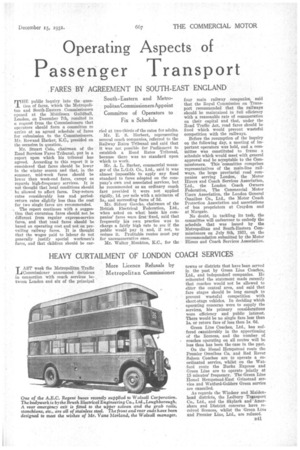Operating Aspects of
Page 59

If you've noticed an error in this article please click here to report it so we can fix it.
Passenger Transport
FARES BY AGREEMENT IN SOUTH-EAST ENGLAND
South Eastern and Metropolitan Commissioners Appoint Committee of Operators to Fix a Schedule T"public inquiry into the question of fares, which the Metropolitan and South-Eastern Commissioners opened at the Middlesex Guildhall, London, on December 7th, resulted in a request from the Commissioners that operators should form a committee to arrive at an agreed schedule of fares for submission to the Commissioners. Mr. Rowand Harker, K.C., presided on the occasion in question.
Mr. Stuart Cole, chairman of the Road Services Pares Tribunal, put in a report upon which his tribunal has agreed. According to this report it is considered that fares should be lower in the winter season and that, in the summer, mid-week fares should be lower than week-end fares, except as regards high-frequency services. It is not thought that local conditions should be allowed to affect fares. Day-return rates considerably less and periodreturn rates slightly less than the cost for two single fares are recommended. , The report continues with a suggestion that excursion fares should not be different from regular express-service fares, and that road fares should be based on operating cost and not on prevailing railway fares. It is thought that the wages paid to labour do not generally justify special workmen's fares, and that children should be car ried at two-thirds of the rates for adults.
Mr. E. S. Herbert, representing several coach companies, referred to the Railway Rates Tribunal and said that it was not possible for Parliament to establish a Road Rates Tribunal, because there was no standard upon which to work.
Mr. A. L. Barber, commercial manager of the L.G.O. Co., Ltd., said it was almost impossible to apply any fixed standard to fares adopted on the company's own and associated services, but he recommended as an ordinary coach fare provided it were not applied rigidly, ld per mile with a minimum of is., and succeeding fares of 3d.
Mr. Sidney Garcke, chairman of the British Electrical Federation, Ltd., when asked on what basis his companies' fares were first fixed, said that frequently his own practice was to charge a fairly high rate to see if the public would pay it and, if not, to reduce it. Profitable routes must pay for unremunerative ones.
Mr. Walter _Monkton, K.C., for the four main railway companies, said that the Royal Commission on Transport recommended that the railways should be maintained in full efficiency with a reasonable rate of remuneration on their capital and that, under the Road Traffic Act, road fares should be fixed which would prevent wasteful competition with the railways.
Before the resumption of the inquiry on the following day, a meeting of important operators was held, and a committee was constituted to frame a schedule which would meet with general approval and be acceptable to the Commissioners. This committee comprises representatives of the main-line railways, the large provincial road companies serving London, the Motor Hirers and Coach Services Association, 'Ltd., the London Coach Owners Federation, The Commercial Motor Users Association, the London General Omnibus Co., Ltd., the Motor Coach Protection Association and associations of bus proprietors at Croydon and at Margate.
No doubt, in tackling its task, the committee will endeavour to embody the schedule that was issued by the Metropolitan and South-Eastern Commissioners on July 8th, 1931, on the recommendation submitted by the Motor Hirers and Coach Services Association.




































































































